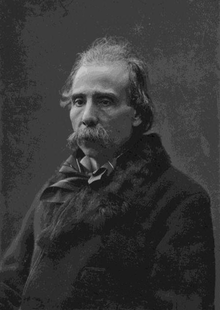
Back كاميلو كاستيلو برانكو Arabic كاميلو كاستيلو برانكو ARZ Camilo Castelo Branco BR Camilo Castelo Branco Catalan Camilo Castelo Branco Czech Camilo Castelo Branco German Camilo Castelo Branco EO Camilo Castelo Branco Spanish Camilo Castelo Branco EU Camilo Castelo Branco Finnish
Camilo Castelo Branco | |
|---|---|
 | |
| Born | Camilo Ferreira Botelho Castelo Branco 16 March 1825 Lisbon, Kingdom of Portugal |
| Died | 1 June 1890 (aged 65) São Miguel de Seide, Vila Nova de Famalicão, Kingdom of Portugal |
| Occupation | novelist, playwright, essayist |
| Nationality | Portuguese |
| Genre | Romance novel |
| Literary movement | Romanticism |
Camilo Castelo Branco, 1st Viscount of Correia Botelho (Portuguese pronunciation: [kɐˈmilu kɐʃˈtɛlu ˈbɾɐ̃ku]; 16 March 1825 – 1 June 1890), was a prolific Portuguese writer of the 19th century, having produced over 260 books (mainly novels, plays and essays). His writing is considered original in that it combines the dramatic and sentimental spirit of Romanticism with a highly personal combination of sarcasm, bitterness and dark humour. He is also celebrated for his peculiar wit and anecdotal character, as well as for his turbulent (and ultimately tragic) life.
His writing, which is centred in the local and the picturesque and is in a general sense affiliated with the Romantic tradition, is often regarded in contrast to that of Eça de Queiroz – a cosmopolitan dandy and a fervorous proponent of Realism, who was Camilo's literary contemporary in spite of being 20 years younger. This tension between Camilo and Eça – often dubbed by critics the literary guerrilla – has been interpreted as a synthesis of the two great tendencies present in the Portuguese literature of the 19th century.
Allegations that he was initiated in Freemasonry in 1846,[1] are somewhat contradictory as there are indications that, around the same time, during the Revolution of Maria da Fonte, he fought in favor of the Miguelists as "helper to the orders of the Scottish General Ranald MacDonell",[2][3] who was active in the revived Order of Saint Michael of the Wing precisely to combat Masonry. Similarly, much of his literature demonstrates his ideals of legitimism and as a conservative and Catholic traditionalist.
- ^ "Grémio Lusitano". Gremiolusitano.eu. Archived from the original on March 3, 2016.
- ^ "Biografia de Camilo Castelo Branco (Lisboa, 1825 - São Miguel de Ceide/Vila Nova de Famalicão, 1890), Centro de Documentação de Autores Portugueses". Direcção-Geral do Livro e das Bibliotecas. January 2005. Archived from the original on September 23, 2015.
- ^ A Vida de Camillo Anno a Anno, por António Cabral, Livraria Ferreira, Lisboa, 1918, pág. 59